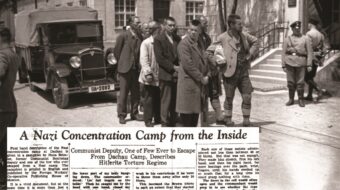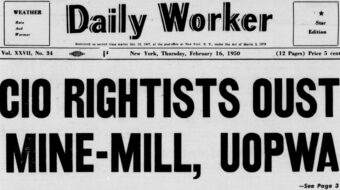
Movie Review: “J. Edgar”
Directed by Clint Eastwood
2011, Rated R, 137 minutes
Political people, especially those of a certain age, will be eager to see Clint Eastwood’s treatment of the life of America’s most notorious secret policeman. They will want to know if it tells the ugly truth about the megalomaniac who destroyed thousands of progressive lives and, lying, cheating and bullying, held the nation in terror for decades, or will Eastwood, whose conservative credentials are well established both artistically and personally, contribute to the childishly distorted heroic version that Hoover himself created during his lifetime?
The answer is good news for those who have studied the history of America from 1919 to 1972 and those who lived through part of it: within the limits of a biographical movie, Eastwood tells it as it happened.
As drama, Eastwood’s opus is excellent. The theme of the rising power and its misuse is explained with a personal view of a severely repressed homosexual with a domineering mother. Eastwood gets great help from the under-performance of the great Judi Dench, who almost steals the movie, as Hoover’s mother and Leonardo DiCaprio, taking yet another adventurous leap from type, in the title role. Naomi Watts as the dutiful secretary and Arnie Hammer as Hoover’s lifelong companion, Clyde Tolson, give outstanding performances.
As an example of movie art, Eastwood has created a masterpiece. He covers the 53-year period with jumps from one highlight to another, but uses extremely effective transitions from one emotional climax to another, years apart, so that the timeline is clear and effortless.
As history or political analysis, the movie only fails in that it is a biography of a single person, not a revelation of underlying developments that made the creation of Hoover’s foul agency possible and even likely. Even though most of the historical events are related from Hoover’s point of view, with only a little bit of resistance from a few easily-quashed underlings, at least they are mentioned. Perhaps the film will motivate today’s protesters to find out about those events and how fair and foul means were employed to stomp them.
Eastwood may also be criticized for skipping from Hoover’s gangbuster period to his deplorable attempts to subvert Dr. Martin Luther King Jr., and the civil rights movement while hardly mentioning the anti-communist witch-hunt from 1947 to the end of Hoover’s life and beyond. It could deserve another movie, but the present work, at 2 hours 18 minutes, is a pretty long watch.
Clint Eastwood’s “J. Edgar” will come across as the historical monster that Hoover surely was, but he also comes across as a human being with motives that, while extreme, are understandable. In summary, J. Edgar Hoover doesn’t get off the hook in the new movie, but the system that created him unfortunately does.
Photo: A still from the films official website.

MOST POPULAR TODAY

Zionist organizations leading campaign to stop ceasefire resolutions in D.C. area

High Court essentially bans demonstrations, freedom of assembly in Deep South


Communist Karol Cariola elected president of Chile’s legislature

U.S. imperialism’s ‘ironclad’ support for Israel increases fascist danger at home






Comments